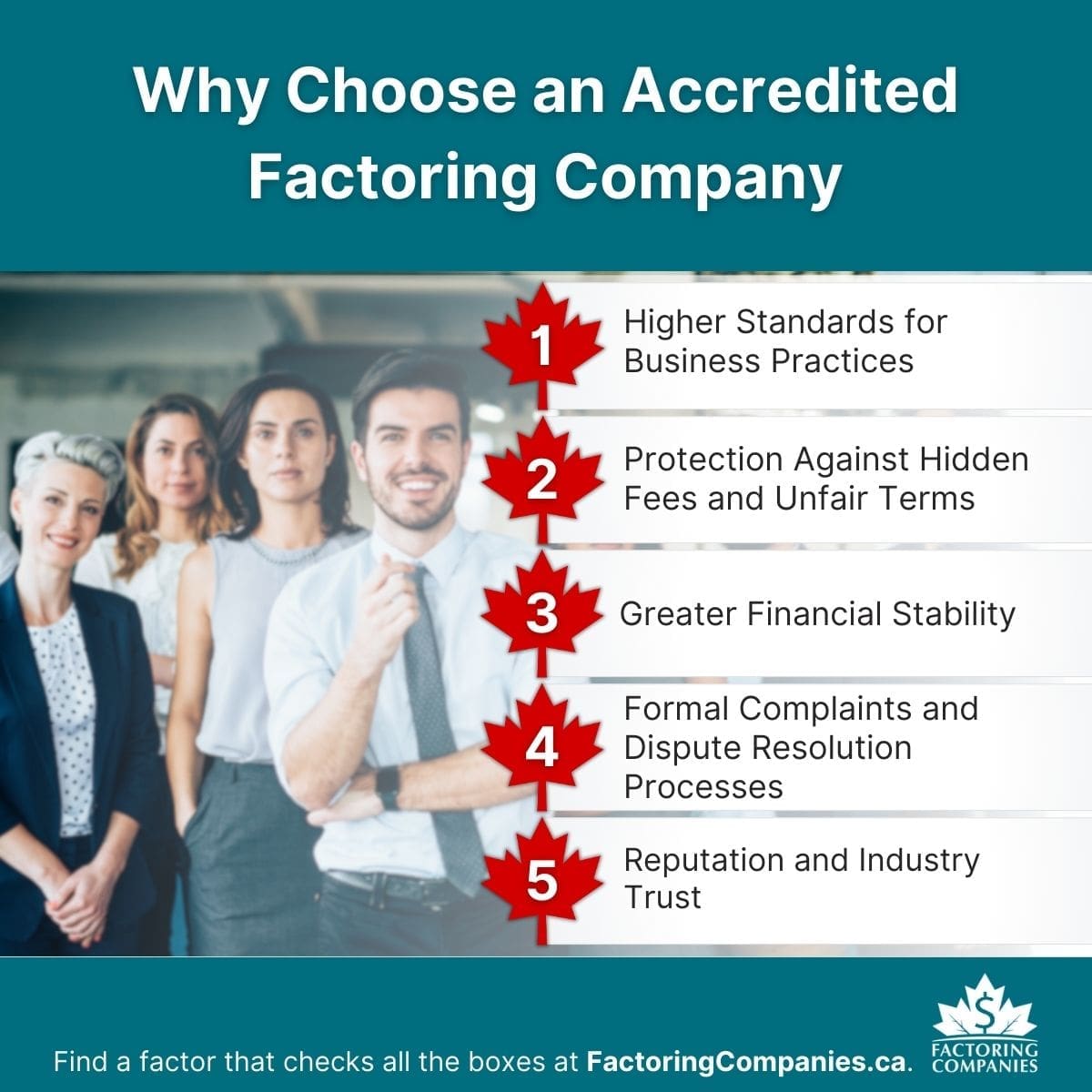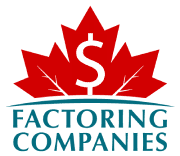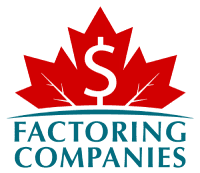
If you’ve spent any time on the websites of factoring companies, you’ve probably seen logos that say CFLA, IFC, or BBB. While they may seem small, they can actually have a big impact on the type of experience you’ll have with that factoring company.
In this guide, we’ll walk you through various factoring company certifications, why they matter, and how to confirm a factor is in good standing.
Factoring Company Certifications Are a Sign of Credibility
Factoring company accreditation is a formal recognition that a factoring business meets established standards for ethical conduct, professionalism, and service quality. It is typically granted by respected industry associations after a company passes a vetting process that examines its operational practices, financial stability, client protections, and business ethics.
Think of it as a quality seal. It’s a sign that the factoring company has gone through extra steps to prove its credibility and is willing to be held accountable to ongoing professional standards.
Accreditation Can Tell You a Lot About the Factoring Company

Choosing an accredited factoring company can have a major impact on your experience and financial health, as accredited factors tend to excel in the areas below.
- Higher Standards for Business Practices: Accredited factoring companies are required to follow a strict code of conduct. This covers everything from how they handle your funds to the transparency of their contracts. Accreditation gives you greater confidence that you will be treated fairly.
- Protection Against Hidden Fees and Unfair Terms: Accreditation often requires factoring companies to disclose all their fees and conditions upfront. This means you are less likely to encounter unexpected charges or fine print that could hurt your cash flow.
- Greater Financial Stability: Accredited companies typically undergo financial reviews to demonstrate that they have the resources to operate responsibly. This reduces your risk of disruptions to funding due to the factoring company’s own financial problems.
- Formal Complaints and Dispute Resolution Processes: If something goes wrong, accreditation provides an extra layer of protection. Accredited companies are usually required to participate in complaint resolution procedures, giving you a clearer path to address issues.
- Reputation and Industry Trust: Factoring companies that earn accreditation show that they are serious about building long-term relationships. In industries where trust is everything, accreditation can separate stable, professional companies from fly-by-night operations.
There Are Many Types of Accreditation
When you are evaluating a factoring company, you may come across different types of accreditation or association memberships. These recognitions are not all the same. Some focus on ethical standards. Others focus on industry-specific expertise or financial responsibility. Understanding what they represent can help you choose the right partner for your business.
Canadian Finance and Leasing Association
The Canadian Finance and Leasing Association (CFLA) represents a wide range of businesses involved in asset-based financing, leasing, and invoice factoring across Canada. Factoring companies that are members of the CFLA commit to following ethical business practices and maintaining professional standards.
Membership signals that the factoring company is connected to a larger financial network and committed to maintaining professional integrity. While the CFLA does not “certify” factoring companies in the way a regulator might, it still requires adherence to an ethical code, and members can be held accountable if they violate those principles.
International Factoring Association
The International Factoring Association (IFA) is a global association that supports factoring companies through education, training, and setting best practices. It is based in the United States but has members worldwide, including Canada.
IFA membership shows that a factoring company is serious about staying informed on international standards, legal changes, and operational best practices. Although IFA membership is voluntary and does not equate to a regulatory licence, it demonstrates a company’s commitment to professional growth and responsible service delivery.
Better Business Bureau Accreditation
The Better Business Bureau (BBB) is an independent organization that evaluates businesses across Canada and the United States based on their trustworthiness and performance. Companies can apply for accreditation and must meet specific standards to maintain it.
A factoring company with BBB accreditation and a strong rating, such as an A or A+, shows that it has a track record of handling customer relationships professionally. It also means you have access to a public complaints history, which can be a valuable research tool before signing a factoring agreement.
Provincial Registrations and Licences
Some provinces require factoring companies to register or be licensed as financial service providers, particularly if they handle collections or financial transactions on behalf of others. Requirements vary depending on where the factoring company is based and where it operates.
You Can Verify a Factoring Company’s Credentials

When you are choosing a factoring company, do not take claims of accreditation at face value. Verifying a company’s credentials is an important step to protect your business from hidden risks.
Check Official Membership Lists
- CFLA Membership Directory: The Canadian Finance and Leasing Association publishes a list of current members on its website. You can search the directory to confirm whether the factoring company you are considering is actually a member in good standing.
- IFA Membership Lookup: The International Factoring Association also maintains a directory. You can cross-reference the company name to confirm active membership. If the company is not listed, they may be misrepresenting their affiliation.
- BBB Accreditation Search: Use the Better Business Bureau’s website to search for the company. Verify whether they are accredited, view their rating, and check any complaints or reviews that have been filed.
Review Provincial Registries
- Provincial Business Registrations: In many provinces, financial service providers must register as legal business entities. Use your provincial business registry to confirm that the company is legally registered and authorized to operate in your province. If you’re unsure which providence a factor should be registered with, you can check most through the national search as well.
- Collection Agency Licences: If the factoring company is collecting on unpaid invoices, they may need a collection agency licence, depending on your province’s laws. Confirm whether they hold a valid, active licence if this applies to their services.
Ask for Proof and Documentation
- Request Copies of Membership Certificates: A reputable factoring company should have no problem providing recent certificates or membership confirmation letters from the organizations they claim to belong to.
- Check the Dates: Make sure any proof they provide is current. Memberships and accreditations often expire annually and must be renewed.
Look Beyond the Logo
Some companies display logos for associations they used to belong to or never formally joined. Never assume that a logo means active membership. Always verify it independently.
Get Matched with a Factoring Company That Checks All the Boxes
Accreditation is just one of the many things we look for when vetting factoring companies. We also consider things like their repetition and whether their offerings look like a good match for your business. When you have Factoring Companies Canada find and recommend factoring companies for you, you’re tapping into decades of knowledge and experience that allow you to streamline your search and move forward with confidence. To take the first step, request a complimentary consultation.
FAQs About Factoring Company Certifications
What certifications should a factoring company have?
Factoring companies do not require a specific certification to operate in Canada, but strong ones often maintain memberships with organizations like the CFLA, IFA, and the BBB. These memberships show a commitment to ethical standards, financial transparency, and professional accountability.
Is membership in the CFLA required for factoring companies in Canada?
No, membership in the Canadian Finance and Leasing Association is voluntary. However, being a CFLA member signals that the factoring company aligns itself with recognized ethical standards and participates in Canada's broader asset-based finance community, which can help you feel more confident in your choice.
Does a factoring company need a licence to operate in my province?
In some provinces, yes. If the factoring company handles collections or financial transactions on behalf of clients, it may require a special licence, such as a collection agency licence. Always check your province’s financial regulations to confirm whether additional licensing is required.
How do I check if a factoring company is accredited by the BBB?
You can visit the Better Business Bureau’s website and search for the company by name. Look for active accreditation status, the company’s rating, and any filed complaints. A factoring company with strong BBB accreditation usually has a track record of addressing client concerns promptly.
What is the difference between a factoring company’s certification and membership?
Membership means the company belongs to an industry association and agrees to follow its code of conduct. Certification, when available, usually means the company has completed specific training or passed an evaluation. In factoring, membership is more common than formal certification.
Are there government regulations for factoring companies in Canada?
Factoring companies must comply with general business laws and financial regulations, but there is no federal body that directly regulates factoring. Some provinces impose additional rules, especially related to collections, consumer protection, and fair business practices. Always verify the local requirements before proceeding.
What are the risks of using a factoring company that is not accredited?
Working with a company that lacks accreditation increases the risk of hidden fees, poor service, weak contract terms, and funding disruptions. Accreditation shows a factoring company’s willingness to be held to external standards, offering you more protection and recourse if something goes wrong.
Can a factoring company operate without being registered?
A legitimate factoring company must be registered as a business in Canada and, if necessary, licensed under provincial law. If a company cannot provide business registration details, that is a major red flag. Always verify registration through your province’s online business registry.
What questions should I ask a factoring company about their credentials before signing a contract?
Ask whether they are members of the CFLA, IFA, or BBB. Request copies of active membership certificates. Verify their business registration and any required provincial licences. You should also ask about their complaint resolution process and how often they renew or update their memberships.

About Factoring Companies Canada
Related Insights
Get an instant factoring estimate
Factoring results estimation is based on the total dollar value of your invoices.
The actual rates may differ.
CLAIM YOUR FREE FACTORING QUOTE TODAY!
PREFER TO TALK?
You can reach us at
1-866-477-1778
Get an instant factoring estimate
Factoring results estimation is based on the total dollar value of your invoices.
The actual rates may differ.
CLAIM YOUR FREE FACTORING QUOTE TODAY!
PREFER TO TALK? You can reach us at 1-866-477-1778











